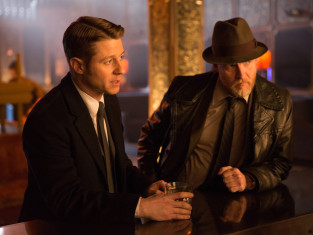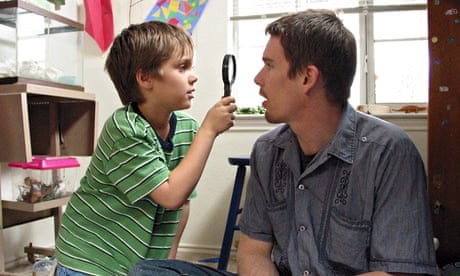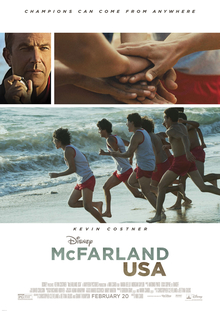GOTHAM: UNDER THE KNIFE
In the hour Under the Knife ran, we got tender moments, funny moments, heartbreaking moments, psychotic moments, and flat-out creepy moments. Gotham, which has pretty much wandered away from its genesis of the Wayne murders, has decided to throw so much at us in the first of its last three episodes we wonder whether a.) we'll ever get that crime solved and b.) what they were doing with poor Fish Mooney (who I figure is recovering somewhere from that shot to her abdomen).
Detective Jim Gordon (Ben McKenzie) fears for his new love, Dr. Leslie Thompkins (Monica Baccarin), since his investigation of Jason Lennon aka The Ogre (Milo Ventimiglia) puts his loved ones at risk. However, Thompkins knows that Gordon won't be denied (even though she is more than capable of defending herself). With that, Gordon does what no other GCPD officer does: go to the press to announce the serial killer. That's enough to put everyone connected to Gordon at risk. However, the Ogre doesn't target Thompkins. He goes after Barbara Kean (Erin Andrews), who is so bonkers herself that Lennon in his odd manner believes is THE one for him (or at least one that will be the perfect rouse to get at his most menacing threat). He romances her, including snagging an invite to the Wayne Enterprises Charity Ball (as a member of high society, Barbara gets an automatic invite).
At long, the Ogre's true story is revealed. He is not from a wealthy family himself. Instead, we learn that growing up, Jason thought he was the son of a wealthy woman, Constance Van Groot. When he learned that he wasn't and that Van Groot was playing a long joke on the kid (who had asked to carry her name and be in the will), he snaps and kills her. His father, Jacob Scalinsky (Daniel Davis), the family butler, hides her murder by not telling anyone she's dead, with the bonus of having Jason have access to her vast wealth. However, Gordon and his partner Harvey Bullock (Donal Logue) come in just when Jacob is attempting suicide, the whole plot beginning to unravel. Jacob has one more surprise for them: that Jason is really physically deformed, with an Elephant Man-type face!
Obviously, he's had a little work done, but that's the clue that ties him in to the first murder of a young girl (who worked at the plastic surgeon's office who reshaped his face). However, that's the point where the hunt is on for Jason Lennon. It may be too late for Barbara, who we see is introduced to Jason's own "Grey Room of Pain".
We then have three other plots going on. The first is young Master Bruce Wayne (David Mazouz) still coming to grips with his frenemy Selina Kyle (Camren Bicondova) killing Reggie. He struggles with the morality of killing, but Alfred (Sean Pertwee) without knowing it tells him that killing in war is justified. Alfred believes this comes from Bruce having overheard his and Reggie's conversation of their time in the service. Alfred also believes that Bruce inviting Selina to be his companion to the Wayne Ball is a sign of romantic interest rather than for her mastery at pickpocketing. Truth be told, Bruce himself isn't sure. Selina, who is still crashing at Barbara's pad, reluctantly dons a dress (and steals the show), leaving both Barbara and Bruce stunned into silence. Selina proves her worth by being able to successfully pick the pocket of Sid Bunderslaw (Michael Potts), the Wayne Enterprises Board member who had sent Reggie on his investigation.
We then get Oswald Cobblepot (Robin Lord Taylor) plotting the death of Don Maroni (David Zayas), but there's a slight wrinkle. Maroni crashes Oswald's club, warming up to Oswald's mother Gertrude Kapelput (Carol Kane). As he literally wines and dines Mama Kapelput, he flat-out asks her if she is all an act or really is this stupid in not knowing what Ozzie is up to. A horrified Gertrude is told that Oswald is a psycho killer, leaving her in shock to where faints. Oswald, who is very protective of his mother, swears he will pay. At home, Gertrude tells Ozzie that she will love him no matter what, but asks him if he has he been doing things he shouldn't be. Oswald tells her he is just a nightclub owner, and Gertrude leaves the room in tears. Oswald himself is in tears, but when a flower delivery man comes with some roses from Sal Maroni, he is enraged to where he tells the delivery guy that Maroni is a dead man. He then smashes the vase and stabs the guy, telling Gertrude he's going to take the trash out.
Finally (seriously, all this was going on in ONE episode), Edward Nygma (Cory Michael Smith) catches Miss Kringle (Chelsea Spack) with Officer Tom Dougherty (Zachary Spicer), who has nicknamed him "Riddle Man". Edward learns that Dougherty has been abusing Miss Kringle (and that Edward is still a virgin). Outside Kringle's apartment, Edward confronts Dougherty, telling him to leave her alone. Dougherty responds by punching Nygma. Nygma responds by pulling a knife.
Here is where it gets tricky: the first time Dougherty is stabbed, we can say it was justifiable self-defense (Dougherty had struck first and had basically rushed him). The second time could be accidental (it looked like Dougherty fell on the knife). All the other times it was clear Nygma was stabbing him repeatedly, both enjoying and horrified by it simultaneously. He laughs at this but also keeps repeating, "Oh dear", a sign that for him, Dougherty's death is both a release and a nightmare.
All that is a lot to pack into one episode, but Under the Knife manages an excellent balance between all the stories to where none of them feel overwhelmed by the other. The bulk of the episode is for the Ogre storyline, and there is an almost cinematic nature to it all: the way Jason sweeps Barbara off her feet at the ball, the introduction to his own version of Fifty Shades of Grey, even Jason's own odd idea of sympathy (he stops from flat-out stabbing her in the back when she talks about how if she died, no one would notice, perhaps finding in the screwed-up Babs someone more bonkers than him). The sheer brilliance of Under the Knife comes in how the episode folded the Ogre storyline to the Selina/Bruce storyline at the ball without them needing to crash into each other.
Here you have two things going on simultaneously: Jason plotting to get at Gordon and the future Batman and Catwoman joining forces to investigate their own case, yet we don't see either pair connecting at the ball. The closest is when Bruce shows up at Barbara's to pick Selina up. Everything in Under the Knife works well, each story getting its moment without overwhelming the other.
We also have simply some of the best acting around. Of particular note is when Carol Kane's Gertrude and Robin Lord Taylor's Oswald go back to her place. Their last scene together is truly heartbreaking as both of them realize that the truth is very ugly. I was so emotionally moved by both of them: the mother who learns the truth, the son who keeps pretending that he is something he isn't.
Miss Kane, Mr. Taylor, please submit this episode for Emmy consideration as Outstanding Guest Actress and Supporting Actor in a Drama respectively.
Perhaps I'm reading too much into this scene, but it plays like an allegory of someone not being able to come out of the closet to their parent, who already knows their son/daughter is gay. Maroni (the jilted lover) has revealed the truth to Gertrude: that her son is a monster and a killer (her son is gay). Gertrude tells Oswald that he is her son and will love him no matter what (read what you will), but then asks if he's been doing bad things (if he's gay). He tells her he's just a nightclub owner (he's straight), but Gertrude is heartbroken to hear this, excusing herself and leaving in tears (he isn't straight or straight with her and both know it). Oswald, this master criminal, sobs like a baby for being deceitful to perhaps the only woman he loves, but when Maroni (the jilted lover) sends a token to taunt her, it causes him to explode. Gertrude asking about who was at the door and pretty much going along with his explanation of having to help the neighbor throw the trash might be that Gertrude will go along with the lie because it's much more comforting than the truth.
Yes, perhaps I am reading too much into all that, but that scene was one highlight for me in terms of acting and story. Another was Cory Michael Smith as Nygma. For the longest time, Ed was just an odd figure in the GCPD, a little quirky but not dangerous. Under the Knife shows that he is now at a total break from morals. He is in love (or at least infatuated) with Kringle, and the thought of someone hurting her is too much for him. Add to that the fact that Dougherty mocks "Riddle Man" down to getting him to admit Nygma's never been with a woman and it's a recipe for disaster. The simultaneous thrill and horror as Nygma repeatedly stabs Dougherty, almost as a compulsion and not something he himself wants, was an astonishing performance. CMS' E. Nygma, who both laughs and keeps repeating "Oh dear" in an almost innocent way, gave us I think his best turn as the future Riddler.
As I've said, there was something extremely cinematic about this Gotham episode. Perhaps at other times, the visual style in Dougherty's death (the backlight, the rumbling of the elevated subway) might have been a bit much, but here it worked. The almost Gothic horror style when Gordon and Bullock enter the Van Groot home to find the snooty butler from The Nanny about to hang himself (and the Norma Bates-like corpse of Ms. Van Groot to boot) are also very cinematic, elevating an already well-written and well-acted episode to something far greater.
Let's not leave out Mazouz and Bicondova, who prove an excellent double-act. His hesitancy about both the repercussions of Reggie's death and potential interest in romance with her world-weariness (I could see Bicondova playing Marlene Dietrich in the future) are a great combination. Individually they are wonderful, together they are virtual perfection.
Finally, in the great duos department, there's the upright Gordon and not-as-upright Bullock. Logue has so grown on me as the sarcastic, shady, but not completely unredeemable mentor to the moral protégé. Both give excellent performances as their characters, to where Gordon's sometimes irritating rectitude is softened by a genuine love for Dr. Thompkins.
As I've said, there are all kinds of great moments, even a touch of comedy (when Alfred hears Bruce wants to take Miss Kyle to the ball, he understands why Master Bruce would be attracted to her, somewhat; "She's a very pretty young girl with a penchant for wearing a little too much leather". Given the bondage that Jason practices, there is so much wit within the episode it makes one's head spin). I laughed out loud when Thompkins whacks Gordon with her phone when he inadvertently sneaks up on her. He should know better than to walk quietly behind a threatened woman. When Selina complains that people are staring at them, her partner calmly replies, "Well, I AM Bruce Wayne."
More hilarity ensues.
The more I reflect on Under the Knife, the more I think what a fantastic episode it was. All the storylines were going on without them overwhelming the other, each story had its moment, all the acting was top-notch. Gotham has done wonders as a great show without going too far one way or the other, and it stands not just as a good Batman prequel but as its own entity.
We just wonder how it will all end.
10/10
Next Episode: The Anvil or the Hammer

































